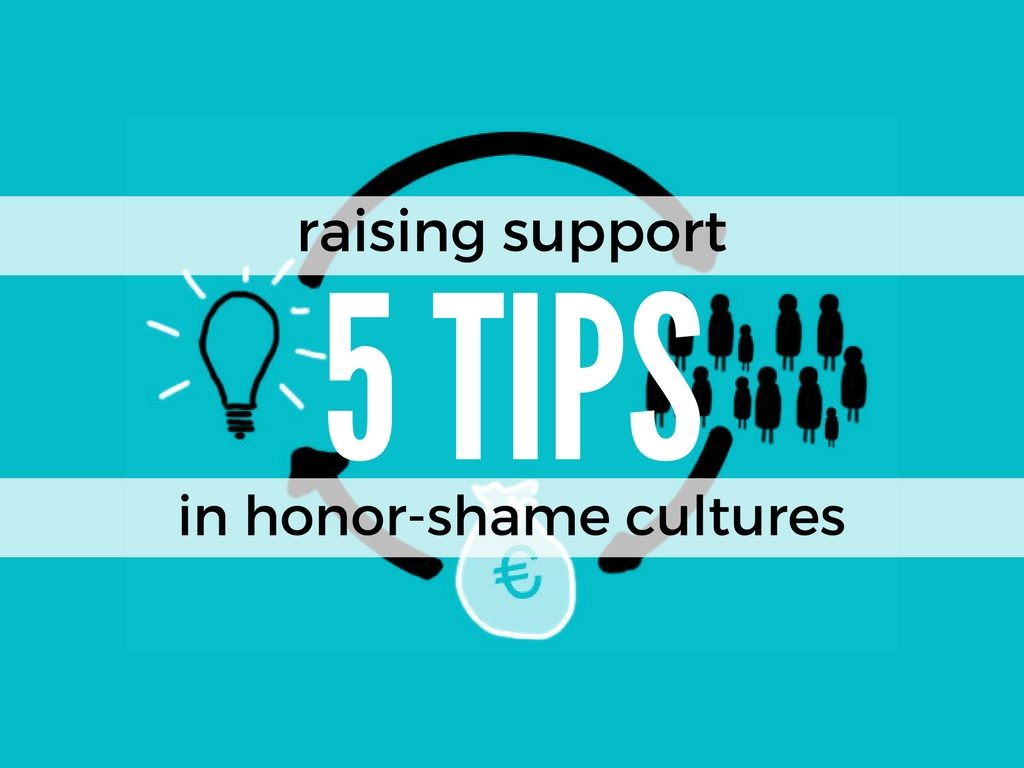Raising Support in Honor-Shame Cultures: 5 Tips
As the global Church expands, there is a growing need for money to fund ministry. The Church in Asia, Africa, and Latin America has a vision for global missions, and this vision requires financial resources.
Traditional fund-raising models are often rooted in a white, Western cultural context, so might not suitably fund ministries in the rest of the World. These 5 tips could help with fund-raising in honor-shame cultures. These are just some ideas, not gaurantees.
1. Address “beggar’s shame”
Even in the West where missionaries are generally esteemed, asking for support can sometimes feel like “begging.” That sense of shame and inferiority for “not having a real job” can be even greater in non-Western contexts, especially where most Christians are first–generation believers. Family and friends may mock believers for being in full-time ministry and asking for support from others. This paradigm of “begging” and feelings of shame, however real they may feel, are not biblical. So they must be addressed and countered with a biblical perspective of money and fundraising before someone can effectively raise ministry funds.
2. Anticipate communal giving
People typically give money within their family, and “family” can be defined rather broadly. In minority communities in the U.S., “[the] tradition of caring for one another means that most giving is done within the community, and choices are made in the context of a larger group—not a single person’s needs. While white culture is proud of its individualism and self-sufficiency, communities of color see interdependence as an important value, thus decisions about giving are normally made with the larger community in mind” (Donna Wilson, in The God Ask, p. 309). People are very loyal to their group, so may be hesitant to give money to a stranger. Whenever possible, try to establish some sort of family connection.
3. Receive “in-kind” gifts
The Western support model is rather impersonal—donors mail a check to a P.O. box, then our salary gets e-transferred to a bank account. In most cultures gift-giving is relationally symbolic and happens in person. So in terms of fund-raising for ministry, this may mean learning to receive (and perhaps request) non-monetary gifts. Support can be “material-based,” not money-based. People may give fresh food, housing, childcare, knowledge, admin help, time, etc.
4. Ask indirectly
Particularly in Asian cultures, making a direct request like “Can you give $50/month?” puts the responder in a difficult position. For them, saying no means losing face and breaking relational harmony. So instead, communicate indirectly to avoid the loss of face. A more appropriate method of “asking” may be through email, mass letter, or simply making your need known without making an explicit request.
Joe Ho (a national director with InterVarsity) explains, “There’s a spectrum of appropriate directness in asking for financial support. What matters is the comfort level of the potential donor. It’s possible to be so direct that you put someone in a position of shame if they don’t give. They may end up giving, but you will have undermined the relationship. You can win the ask but still lose currency in the system of honor and shame.”
5. Respect the hierarchy
Honor-shame cultures are generally hierarchical. Leaders control the funds and make financial decisions. For support-raising, it is critical to honor the proper authority and communicate with the correct people. For example, a pastor may be offended if you ask individuals in his church for support without first talking with him. The hierarchical nature can actually make support-raising easier—if an older, respected person advocates on your behalf, you gain credibility and trust in the entire community. Gaining the support of leaders is essential for support raising.
For more, Support Raising Solutions offers helpful suggestions about raising personal support in Africa, Asia, India, and Latin America.

Some helpful tips for the mobilization work in Mexico.
Thanks!
Kevin
RE: 2. Anticipate communal giving
Is it conceivable to ask an extended family to make a joint decision about their total gift to a missionary rather than to ask one family member or one nuclear family at a time? If that were done, then the giver (family member A) would not feel he/she was giving the missionary money that should have been kept in reserve to help family member B in case a crisis hits. Family member B was in on the family decision to give to the missionary in the first place.
Also, the missionary would not need to know how much the various members of the family were each chipping in. The missionary would relate to the family as a community.
Helpful insights for honor/shame cultures to give to God’s work in the ministry. Thanks.
The last point (#5) is especially valuable. When a respected “elder” of a community (or church) advocates on your behalf it makes a big difference.
A support-raising video from an Asian-American perspective…though I had to “point” it towards “recruiting,” nevertheless, it’s really a testimony on honoring parents in the midst of support-raising. http://www.youtube.com/watch?v=NM4fnxciPS0
This insights from terry sher man are balance will be helpful for honour -shame cultures I could relate to the 5 points easily! Thanks